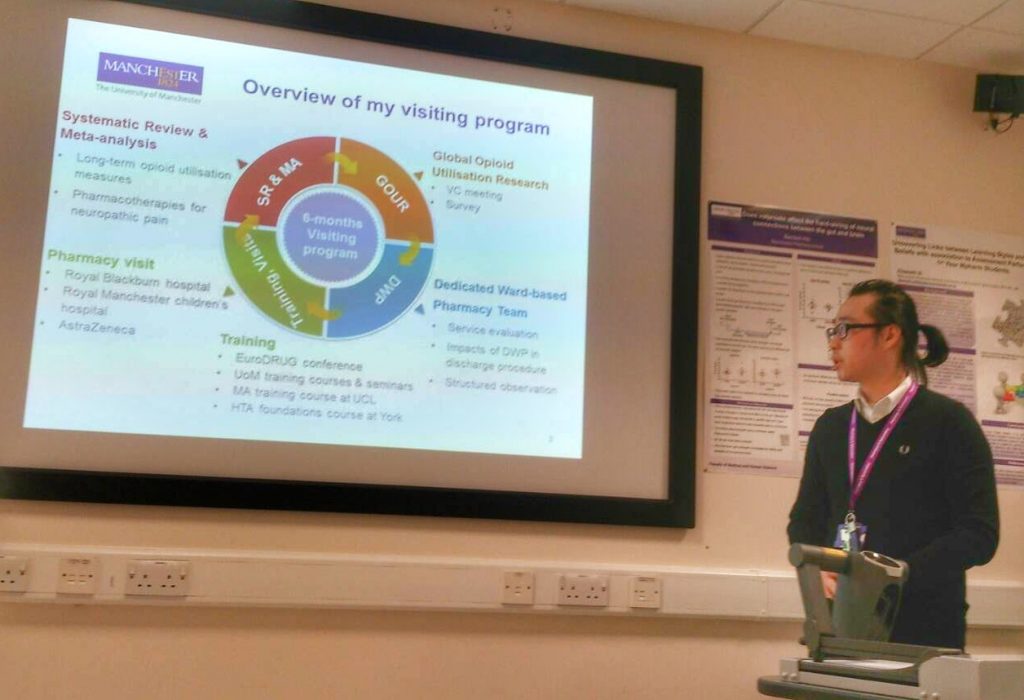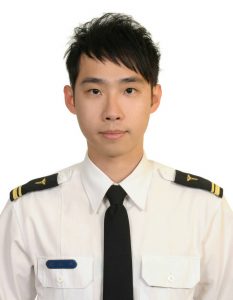
My work for being a visiting research pharmacist in the UK
I am a Taiwanese pharmacist and had a six-month visiting research experience at the University of Manchester from October 2017 to March 2018, supervised by Dr Li-Chia Chen. After returning to Taiwan, many people were curious about what I learned and whether studying abroad was worth it. I want to share my academic activities in the UK in the following four domains.
1.Systematic review
The systematic review is a type of literature review that uses systematic methods to collect secondary data, critically appraise research, and synthesise studies.
The systematic review I conducted focused on summarising the measures of persistent opioids in chronic non-cancer pain patients. I identified and evaluated the relevance and appropriateness of the measurement of opioids in observational studies among patients with chronic non-cancer pain. The results of this study were presented at the 2018 International Society of Pharmacoepidemiology (ISPE) annual conference.
2. Meta-analysis and sequential trial analysis
Meta-analysis is a statistical method commonly used in evidence-based medicine to integrate existing results. Trial Sequential Analysis (TSA) is a methodology that combines an information size calculation (cumulated sample sizes of all included trials) for a meta-analysis with the threshold of statistical significance.
After taking relevant statistical courses at the University College London statistics course and the University of York, I worked on a PhD student’s thesis – “the efficacy and side effect of drugs in patients with neuropathic pain”, supervised, as an example to practice my statistical skills and validate the analytical results.
3. Global Opioids Utilisation Research
In 2015, the Special Interest Group on Drug Utilisation (DU/SIG) of ISPE presented an initiative on the Global Opioids Utilisation Research (GOUR) to identify critical factors related to opioid use, such as disease prevalence, clinical guidelines, health policies, and drug prices will help to develop interventions to improve proper opioid prescriptions. My supervisor, Dr Li-Chia Chen, is the general convener of this research programme. As a visiting researcher, I was honoured to be included as one of the staff in this research.
I was responsible for assisting my supervisor in conducting literature searches and arranging cross-national video meetings, such as establishing group directories, survey meeting times, etc. Then the first video meeting was held in January to communicate the current status of the usage of opioids in various countries, discuss the content of the follow-up questionnaire and the future direction of research was also decided. After the meeting, I started to produce the questionnaire after discussing it with my supervisor. The project has been completed and on the process of being published.
4. Guiding MPharm year-four students’ research
I was delighted that my supervisor agreed to let me be a teaching assistant for the MPharm students’ project. I researched with students, focusing on “Effects of discharge between the ward had dedicated pharmacist or not.” This topic will be chosen because the typical hospitalisation process in the UK includes five domains: admission, assessment, treatment, monitoring and discharge. This study explored what factors will affect the speed of discharge procedures, clinical appropriateness and safety, especially any problems that may arise before discharge.
The academic visit was to visit the National Health Service (NHS) hospitals at Blackburn and Manchester to learn about the pharmaceutical services of the British public hospital pharmacy in my visiting programme. For example, in Blackburn hospital, about half of pharmacists did clinical tasks in the ward, such as reviewing inpatient medical records and prescriptions and discussing medications and related issues with other health care professionals.
In addition, I also visited the AstraZeneca Pharmaceutical Factory in the UK with 2nd-year undergraduate students. I learned the pharmaceutical manufacturing process and the pharmaceutical industry’s career development. I understood that a pharmaceutical company is not only set a target of making money but to improve the health of the people in the country.
Overall, I had excellent experiences involving those academic activities, which trained me to be an independent researcher and think critically about analysing different related issues of pharmacy practices.

Hsin-Te Lin
Executive officer
Pharmaceutical Management Division, Medical Affairs Bureau, Ministry of National Defense, Taiwan






0 Comments